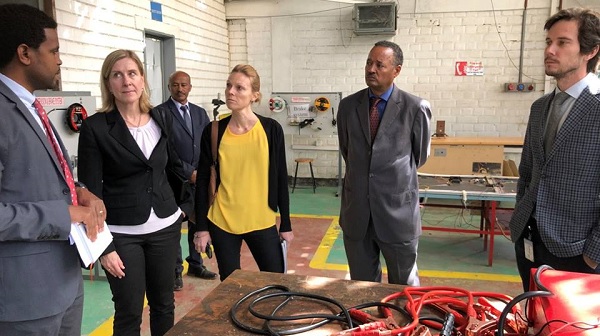
HDECoVA is the first state of the art vocational training for heavy machinery in Ethiopia with an aim to prepare young people for future livelihoods and facilitate access to employment opportunities.
ADDIS ABABA–The Swedish Embassy and the Swedish International Development Cooperation Agency (Sida) representatives from Stockholm made a half-half visit, on 12 February 2018, to Selam Children’s Village in the outskirts of Addis Ababa.
Sweden, together with Gothenburg-based Volvo Construction Equipment (Volvo CE) and Selam Children’s Village are co-funding the Heavy Duty Equipment and Commercial Vehicles Academy (HDECoVA) – an innovative project implemented by the United Nations Industrial Development Organization (UNIDO) aiming to prepare young people for future livelihoods and facilitate access to employment opportunities.
Launched in 2012, HDECoVA is the first state of the art vocational training for heavy machinery in Ethiopia. The academy is open to applicants irrespective of their background and trains 25-30 students a year. During the four-year course students access modern machinery and also do courses in English and Information Technology.
Through training young and talented female and male students in mechanics, the project not only brings about a well-equipped young force that is contributing to an improved transport sector in the country – gender norms are also broken and employment opportunities are offered to both women and men in a sector traditionally dominated by men!
According to the Swedish Embassy in Addis Ababa, the support (funding) for the first phase for the Mechanics’ school has now come to an end – with the program successfully running on its own. Currently a new Drivers’ school is in the inception phase and will commence in about two months, with the support from Sweden, Volvo CE and Selam Children’s Village.
ALSO: Hands-on Training in Ethiopia, Partnering for a Better Future – Selam TVET College
HDECoVA, with its project, has been highly successful and is now gaining increased interest from other development partners. “Sweden’s contribution has been immense – without it this would not have been possible,” said Abera Melesse Ayalneh, HDECoVA’s National Project Coordinator for UNIDO.
By supporting innovative projects such as this Public-Private Partnership, Sweden is pursuing its feminist foreign policy which among other things aims to strengthen women’s and girls’ economic empowerment and influence. (Credit: Embassy of Sweden, Addis Ababa)
